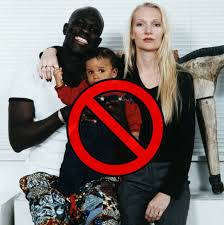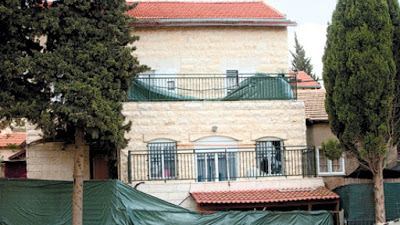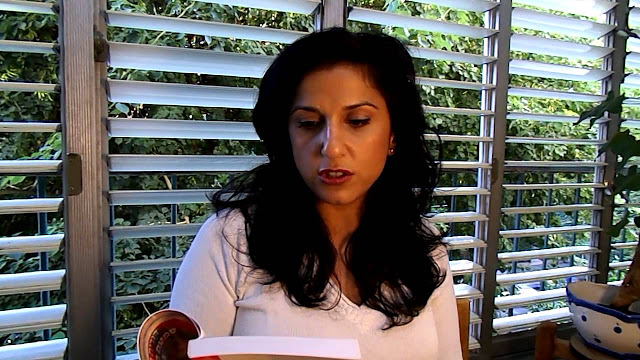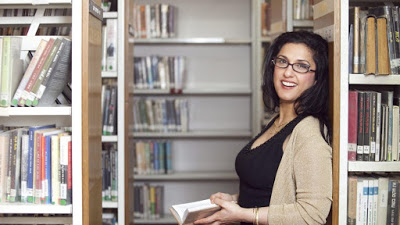 |
| In Israel – mixed marriages are a no-no |
You might, in your
innocence, think that a book on an Arab-Jewish romance would be just the thing
that would be welcomed as a way of breaking down barriers and enhancing
understanding and tolerance between Palestinians and Israeli Jews. However you would be very foolish to do so,
because Israel operates under a different value system to most other
societies.
Israel is a Jewish racial
state and miscegenation, the mixing of the ‘races’ is strictly forbidden in Israel. Not legally of course, because Israel has to
formally adhere to western values, but in the accepted and unwritten Zionist consensus. A consensus that includes a shared practice
and beliefs. This consensus operates
across all of Israel’s Zionist political parties from Likud to Labour.
when it comes to settler colonial states.
Marriage and sex between the coloniser and colonised was banned or
looked upon with extreme disfavour in British
colonies from India to Southern Africa.
It was termed ‘the Black peril’. In South Africa the 1927 and 1950 Immorality Acts and the 1957 Sexual
Offences Act forbade interracial sex and marriage.
Laws and specifically the Law for the Protection of
German Blood and German Honour which specifically forbade sexual relations or
marriage between Aryans and Jews (later amended to Romanis and Blacks). Israel has no such Act but then it doesn’t need
to ban Arabs and Jews from marrying. It’s
just that it is impossible for them to do so since there is no civil marriage in
Israel.
 |
| Benny Gopstein, Kahanist and Head of Lehava, fascist anti-miscegenation organisation |
course it is still possible for Arabs and Jews to have sex and relationships outside
of marriage which is why Israel’s Social Affairs Ministry, in its wisdom has
given a grant of around £120,000 each year, about half its running costs, to Hemla,
the ‘charitable’ wing of the fascist anti-miscegenation organisation,
Lehava. [A Strange Kind of Mercy, http://www.haaretz.com/israel-news/a-strange-kind-of-mercy-1.364417]
The head of Lehava, who is also employed by Hemla, Benny Gopstein, supports the burning
down of mixed Arab-Jewish schools (its supporters were convicted of arson at
the Hand in Hand school in Jerusalem) and Christian churches. The Knesset under
the guidance of Israel’s Deputy Foreign Minister, Tzipi Hotoveli agreed to fund
the good work of Hemla in helping to ‘rescue’ Jewish girls who had fallen for
the wiles of Arab men. Radical Jewishgroup’s head advocates burning churches
 |
| Hemla – the ‘charitable organisation’ in Jerusalem, funded by the Israeli government, which rescues fallen Jewish girls who have been seduced into relationships with Arab men |
of western sensitivities, the criminalisation of interracial sex in Israel cannot
be made a crime, though an Israeli Arab was gaoled for passing himself off as a
Jew for the purpose of having sex with an Jewish woman. Arab who posed as a Jew jailed for rape ‘bydeception’
 |
| Gopstein and thugs patrolling Jerusalem looking out for Arab men who might ‘endanger’ Jewish women. ‘Jewish girls for a Jewish state’ is their slogan |
this logic, then a married man who has sex with a woman, after telling her that
he is single, could also be prosecuted for rape, even though the sexual
intercourse was consensual.
it is therefore quite understandable that a novel encouraging inter-racial sexual
relations should be banned from schools where impressionable youngsters, who
don’t understand the evils of Arab-Jewish romance, will be protected from harm.
 |
| Gopstein temporarily under arrest |
the Education Ministry’s pedagogic secretariat, Dalia Fenig [she is the acting Chair because Bennett dismissed the previous Chair] explained her reasons thus:
reader in a very tangible and powerful way with the dilemma of the
institutionalization of the love while he [the reader] doesn’t have the full
tools to weigh the decisions of such a nature,”
asserted that:
romantic motif of impossible prohibited/secret love. Young people of adolescent
age tend to romanticize and don’t, in many cases, have the systemic vision that
includes considerations involving maintaining the national-ethnic identity
of the people and the significance of miscegenation.”
is something ironic in the fact that the novel that deals with the Jewish fear
of assimilation in the Middle
East was eventually rejected by this very fear.”
 |
| Dorit Rabinyan reading from Persian Brides, an earlier novel |
takes another step down a very dark path. Here is the news from
Haaretz today:
Bans Novel on Arab-Jewish Romance From Schools for ‘Threatening Jewish
Identity’
Education Ministry has disqualified a novel that describes a love story between
an Israeli woman and a Palestinian man from use by high schools..
comes despite the fact that the official responsible for teaching of literature
in secular state schools recommended the book for use in advanced literature
classes, as did a professional committee of academics and educators…
people of adolescent age tend to romanticizing and don’t, in many cases, have
the systemic vision that includes considerations involving maintaining the
identity of the people and the significance of assimilation.”
novel is Borderlife by Dorit Rabinyan. It is blurbed by Amos Oz. A
description:
begins in the cold of early New York winter ends on a Jaffa beach at summer’s
blinding peak. A chance encounter brings two strangers together: Liat, an
Israeli from Tel Aviv, and Hilmi, a Palestinian born in Hebron. For one frozen
winter away from home, on snowy streets, filled with longing for a Middle
Eastern sun, Liat and Hilmi demarcate the place reserved only for them, an
intimate short-term place, a universe for two. At the fissures and margins of
things, in corners and in gaps, the reality lurking in Israel peers and snarls
at them. The story, with its twists and passions, follows them even when they
each go their own way – Liat returning to Tel Aviv and Hilmi to the village of
Jifna, north of Ramallah – refusing to end.’
will liberal Zionists say about this? When do you conclude that this kind of
intolerance and racism is built into the very idea of religious nationalism?
Henry Siegman writes in Haaretz today that American liberal values are not
shared by Israel. And yes, we’re trying to live up to them over here; but it’s
impossible to imagine this kind of official action here.
to Ofer Neiman
responsible for teaching of literature in secular state schools recommended the
book for use in advanced literature classes, as did a professional committee of
academics and educators.
31, 2015 12:57 AM
 |
| Students taking a matriculation exam at a high school in Hadera. Alon Ron |
Education Ministry has disqualified a novel that describes a love story between
an Israeli woman and a Palestinian man from use by high schools around the
country. The move comes even though the official responsible for literature
instruction in secular state schools recommended the book for use in advanced
literature classes, as did a professional committee of academics and educators,
at the request of a number of teachers.
reasons stated for the disqualification of Dorit Rabinyan’s “Gader Haya”
(literally “Hedgerow,” but known in English as “Borderlife”) is the need to
maintain what was referred to as “the identity and the heritage of students in
every sector,” and the belief that “intimate relations between Jews and
non-Jews threatens the separate identity.” The Education Ministry also
expressed concern that “young people of adolescent age don’t have the systemic
view that includes considerations involving maintaining the national-ethnic
identity of the people and the significance of miscegenation.”
book, published in Hebrew by Am Oved about a year and a half
ago, tells the story of Liat, an Israeli translator, and Hilmi, a
Palestinian artist, who meet and fall in love in New York, until they part ways
for her to return to Tel Aviv and he to the West Bank city of Ramallah. The
book was among this year’s winners of the Bernstein Prize for young writers.
familiar with the ministry’s approach to the book said that in recent months a
large number of literature teachers asked that “Borderlife” be included in
advanced literature classes. After consideration of the request, a professional
committee headed by Prof. Rafi Weichert from the University of Haifa approved
the request. The committee included academics, Education Ministry
representatives and veteran teachers. The panel’s role is to advise the ministry
on various educational issues, including approval of curriculum.
the source, members of the professional committee, as well as the person
in charge of literature studies, “thought
that the book is appropriate for students in the upper grades of high schools –
both from an artistic and literary standpoint and regarding the topic it
raises. Another thing to remember is that the number of students who study
advanced literature classes is anyhow low, and the choice of books is very
wide.”
in the Education Ministry said that the process took a number of weeks, and
that “it’s hard to believe that we
reached a stage where there’s a need to apologize for wanting to include a new
and excellent book into the curriculum.”
 |
| Dorit Rabinyan. Credit David Bachar |
Minister Naftali Bennett’s office said: “The
minister backs the decision made by the professionals.”
ministry officials, Eliraz Kraus, who is in charge of society-and-humanity
studies, and the acting chair of the pedagogic secretariat, Dalia Fenig, made
the decision to disqualify “Borderlife.”
of December, the head of literature studies at the ministry, Shlomo Herzig,
appealed their decision, but his appeal was recently denied.
of a work of literature from the body of work approved for instruction and
included in literature curriculum doesn’t seem acceptable to me,” Herzig wrote to Fenig. “In
all my all too many years as head of literature studies, I don’t recall even a
single instance that a work of literature recommended by a professional
committee by virtue of its authority, after thorough and deep discussion, was
not approved for use by the chairman of the pedagogic secretariat.”
portion of Fenig’s first letter of opposition to the book, which noted concern
that it would encourage romantic relations between Jews and Arabs. “The acute problem of Israeli society today
is the terrible ignorance and racism that is spreading in it, and not concern
over intermarriage,” Herzig wrote. “The
idea that a work of literature is liable to be the trigger for romanticizing
such a connection in reality is simply ridiculous.” He added that he would
expect the Education Ministry to be “a
lighthouse of progress and enlightenment and not be dragged along by empty,
baseless fears.”
literature (and other subjects) is eliminating all or some work which we don’t
favor out of ethical considerations. In such a situation, there is no reason to
teach literature at all. If we would have wanted our students to study only
‘respectable’ and conservative works, we would be left without a curriculum, or
with a list of shallow and dull works of literature. Stellar international
works such as ‘Crime and Punishment’ (the murder of elderly women), ‘Anna
Karenina’ (betrayal and adultery), ‘Macbeth’ (the murder of a king and all of
his relatives and members of his household) would not [get close] to a
literature curriculum in an ethical literary ‘respectable’ world.”
a rehearing of the issue at the pedagogic secretariat, which Fenig is
temporarily heading since Bennett dismissed the previous chairman, Dr. Nir
Michaeli. The post of chairman is considered one of the senior positions at the
Education Ministry. The rehearing, in which Herzig and members of the
professional committee members took part, didn’t reverse the decision to
disqualify the book.
Fenig sent another letter in which she explained the reasons for her decision.
She noted that “in the Israeli reality of
the Jewish-Arab conflict,” the book “in
some classes” could “create the
opposite result from what the work is seeing to present,” but dedicated
most of her comments to concern over contact between Jews and Arabs.
reader in a very tangible and powerful way with the dilemma of the
institutionalization of the love while he [the reader] doesn’t have the full
tools to weigh the decisions of such a nature,”
Fenig asserted. “The story is based on a
romantic motif of impossible prohibited/secret love. Young people of adolescent
age tend to romanticize and don’t, in many cases, have the systemic vision that
includes considerations involving maintaining the national-ethnic identity
of the people and the significance of miscegenation.”
critical discussion to be held in class, if it is held, will not stand up to
the very powerful message in the work that what was right and good was
fulfilling the love between Hilmi and Liat.”
that many parents in the state school system would strongly object to having
their children study the novel and would view it as a violation of the relationship
of trust between parents and the school system. “It should be remembered that the choice of studying the work is the
teachers’ and not the students’. Intimate relations and certainly the open
option of institutionalizing [a relationship] through marriage and having a
family, even if it doesn’t come to fruition in the story, between Jews and
non-Jews is perceived among large segments of society as a threat to a separate
identity.”
previous publications – “Our Weddings”
and “Am Oved” – are taught in
schools. According to the author, “It’s a
great honor that my creations pierce the souls of young people and affect them.
I would be happy if Israeli literature teachers were given the authority to
choose whether to teach ‘Borderlife’ as well.”
‘Borderlife’ also tells the story of intelligent adults. The hero of the story
grew up and developed within the borderlines set by Israeli society, among the
Jewish majority, the Arab minority and the Palestinian neighbors. Her difficult
choice, to turn away from love, is the choice of a young woman whose main
Zionist identity is deeply ingrained within her. There is something ironic in the fact that the novel that deals with
the Jewish fear of assimilation in the Middle East was eventually rejected by
this very fear.”
Ministry said, “Professionals discussed the topic of including the work in the
curriculum. After carefully examining all the considerations, and after
weighting the advantages and disadvantages, the professionals decided to not
include the work in the curriculum for five-unit literature studies,” referring
to advanced literature classes.
that also told the stories of Jews who marry outside the faith include Haim
Bialik’s “Behind the Fence,” Isaac Bashevis Singer’s “The Slave,” Shmuel Yosef
Agnon’s “The Lady and the Peddler” and Sami Michael in “A Trumpet in the Wadi.”
All were and some still are taught in schools.